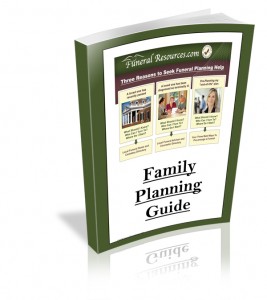End of Life
Checklist for Terminally Ill Planning
When a loved one is diagnosed as being terminally illn, this is devastating news no one is prepared for. You, or a loved one, learn you are terminally ill. You have six months…a year…or maybe several years to live. The doctor tells you to go home and settle your affairs.
The emotional issues involved with such news typically, and understandably, take priority. However, addressing financial issues is critical too. For example; How will the medical bills be paid? Should you continue to work? What about funeral estate planning and investment strategies? How will the emotional issues affect the financial decisions?
The following terminally ill planning advice is a checklist of some of the financial issues that need to be addressed with both the family, as well as funeral and financial professionals.
Start planning immediately. This can often be difficult because of emotional issues such as denial. Yet the reality is that time is of the essence, and end of life planning can be surprisingly comforting.
A Brief Checklist of Important Details to Review:
Learn Disease Costs
What are the costs expected with the terminal illness, and at what point during the course of the disease will they occur? Talk to the doctors and to specific organizations such as the Alzheimer’s Association or the American Cancer Society.
Budget
Budget not only the disease costs and daily living expenses, but special wishes of the dying person, such as a dream vacation.
Keep Working?
Work may provide critical financial, medical or psychological benefits. Or one might also consider changing to a less demanding job.
Review Health Insurance
Is your terminal illness a pre-existing condition under the current policy? What is your waiting period? What are the lifetime maximum benefit details? How much must be paid out of pocket? Will it cover experimental treatments? When might your coverage expire?
Consider COBRA
A worker leaving an employer may be able to continue group policy coverage up to 29 months under a federal law known as COBRA (36 months for spouse and dependents). Ask about this important information before leaving work.
Review Disability Insurance.
Is disability insurance through work or a personal policy available? What percentage of earned income will it replace? What is the waiting period before benefits kick in? Are the benefits taxable? Any state sources available?
Establish Care
Where is the person likely to go for care? A nursing home? The hospital? A hospice care facility? Can family members help at home? Each option has associated costs to consider.
Review Life Insurance
Someone with a terminal illness might be able to tap the cash value in their life insurance policy. The policy also may pay what is called “accelerated benefits,” or the policy may be sold to a third party, called a “viatical settlement.” These “living benefits” pay in cash a percentage (30 to 90 percent) of the death benefits. Obviously, keeping life insurance and burial insurance premiums paid up is critical too.
Revisit Investments
It may be smart to move at least some money from higher-risk, long-term investments such as stocks into readily accessible, less risky investments like a money market mutual fund or short-term bonds.
Assess Other Assets
Is money available from IRAs, qualified retirement plans, or equity in property such as a home?
Review Government Resources
People with few assets and little income usually can qualify for Medicaid to pay for nursing home care. Medicare and Medicaid can pay for hospice care. Social Security might pay disability income.
Consider Tax Issues
Many of the checklist items may pose tax planning issues that need to be addressed, such as early withdrawals from IRAs or selling highly appreciated investments.
Draft or Update Estate Planning Documents
Every adult should have a Last Will or Living Trust. A durable power of attorney lets a trusted person make and carry out legal and financial decisions on behalf of another person. A living will describes what life-saving medical treatment the person wants or doesn’t want. A health care proxy gives a trusted person the power to make medical decisions if the dying person is unable to do so.
Review Beneficiaries
Be sure beneficiaries are up to date in your Last Will, on insurance policies, retirement plans and so on.
List Financial Documents
Let a trusted person know where important financial documents are located. See this article regarding our guide to creating a Love Drawer.
Hire Professional Help
A qualified financial planner, an estate planning attorney and other financial professionals can be of immense help in making sure that the best plan is created and carried out.
This article was produced with the help the Consumer Affairs Dept. of The Institute of Certified Financial Planners.







